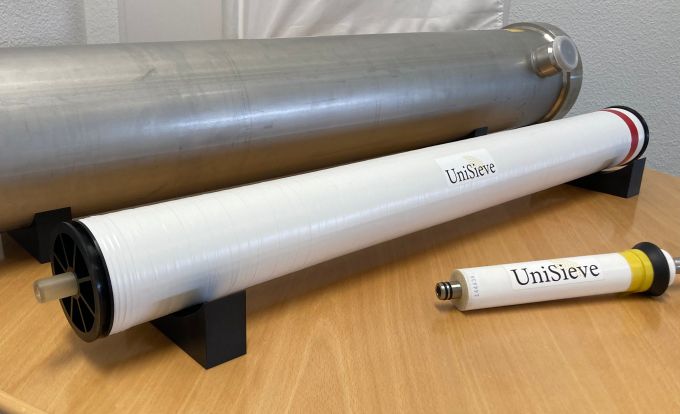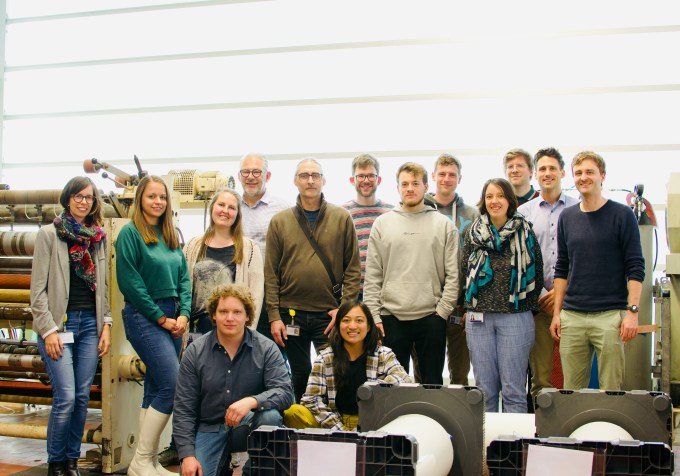The energy-intensive process of separating and purifying chemicals and gases is a big reason industries like plastic manufacturing cause so much pollution. UniSieve wants to reduce their carbon emissions and operational costs with its tech, which uses a high-precision membrane with special crystals that can filter specific molecules and ions.
Today the Zurich-based startup announced it has raised $5.5 million in seed funding to pilot and expand its operational capacities. The round, which UniSieve said was oversubscribed, included participation from the Amadeus Apex Technology Fund, Wingman Ventures, CIECH Ventures and Zürcher Kantonalbank.
UniSieve was founded in 2018 by ETH Zürich classmates Samuel Hess and Elia Schneider. During the course of their work, they developed a way to integrate porous crystals called zeolitic materials into polymeric membranes and use them for high-precision filters.
They also figured out how to make manufacturing scalable. UniSieve is already making revenue and currently has more than 24 clients, including chemical and energy companies. Currently focused on CO2capturing, UniSieve is also piloting hydrocarbon (organic compounds made of hydrogen and carbon) separation applications.
Heavy industries, including plastics, chemical and gas plants, have legacy systems in place that are worth billions of dollars, said Hess. These often include processes for separation and purification that require a lot of thermal energy. UniSieve’s modular filters, which Hess compared to Nespresso capsules, can be integrated into existing manufacturing systems.

UniSieve stands for “universal sieving” and its technology does not use thermal energy. Instead, its membranes separate chemicals, energy carriers and CO2from flue gas based on size exclusion. To use another coffee-related metaphor, UniSieve’s membranes are like the coffee filters that keep your drink free from grounds. Like Nespresso or printer manufacturers, UniSieve sells containerized separation systems and membrane replacement services.
When asked to explain what it means to “integrate zeolitic materials into polymeric membranes” in layperson’s terms, Hess explained that “it’s like adding special filters to a plastic membrane to make it work better at purifying water, filtering gases and performing other tasks.”
Techcrunch eventJoin 10k+ tech and VC leaders for growth and connections at Disrupt 2025
Netflix, Box, a16z, ElevenLabs, Wayve, Sequoia Capital, Elad Gil — just some of the 250+ heavy hitters leading 200+ sessions designed to deliver the insights that fuel startup growth and sharpen your edge. Don’t miss the 20th anniversary of TechCrunch, and a chance to learn from the top voices in tech. Grab your ticket before Sept 26 to save up to $668.
Join 10k+ tech and VC leaders for growth and connections at Disrupt 2025
Netflix, Box, a16z, ElevenLabs, Wayve, Sequoia Capital, Elad Gil — just some of the 250+ heavy hitters leading 200+ sessions designed to deliver the insights that fuel startup growth and sharpen your edge. Don’t miss the 20th anniversary of TechCrunch, and a chance to learn from the top voices in tech. Grab your ticket before Sept 26 to save up to $668.
San Francisco | October 27-29, 2025 REGISTER NOWHess and Schneider originally worked on water purification membranes before they had their “lightbulb moment.” The two introduced zeolitic materials, or porous crystals, into polymeric, or plastic-like, membranes. Hess explained that zeolites have a well-defined pore structure that can trap or selectively filter certain molecules or ions. When added to polymeric membranes, the combination results in better selectivity, permeability and stability, especially for separating gases.

One challenge UniSieve had to solve is that chemicals can vary in size by a fraction of an angstrom (or one-tenth of a nanometer). That means its filters have to be extremely accurate. Hess said UniSieve’s ability to be precisely tuned means it can be adapted to many different applications, including separating other gases besides CO2.
Hess said UniSieve competes against other new technologies like distillation or amine scrubbing, which uses special solvents to remove acid gas. “Compared to such systems, UniSieve’s membrane solution is up to 90% more energy efficient and can be applied at small, as well as large scale. There are a few emerging companies trying to get into the chemical purification market with membranes, too,” Hess said. “Due to operational limitations, a broad application of these competing membranes does not seem realistic.”
In a statement, Wingman Ventures founding partner Lukas Weder said, “The UniSieve technology solution has been tried, tested and is ready to be deployed and so, perfectly positioned to help companies quickly over to build very powerful energy efficient production processes.”

